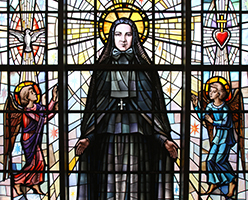
DENVER (CNS) — St. Frances Xavier Cabrini’s “Christ-like love for others is an inspiring example for all of us to this day,” said a statement from the Archdiocese of Denver issued in advance of Colorado’s new Cabrini Day honoring the patron of immigrants Oct. 5.
In February, the Colorado House approved a measure to do away with the state’s observance of Columbus Day, a federal holiday on the second Monday of October, and instead create the Cabrini observance.
The Colorado Senate followed suit in early March, and Gov. Jared Polis signed the bill into law.
“We commend the state Legislature for creating the first state holiday honoring a woman, and for choosing an incredible Catholic saint,” the archdiocese said.
Popularly known as Mother Cabrini, the saint is revered for her devotion to children, immigrants and the destitute.
Born in Italy, she was the foundress of the Missionary Sisters of the Sacred Heart. Her dream was to go to China but at the insistence of Pope Leo XIII, who asked her to work among Italian immigrants in the United States, she left Italy for New York in 1889, accompanied by six sisters.
She established orphanages, schools and Columbus Hospital, and held adult classes in Christian doctrine. She received requests to open schools all over the world. She traveled to Europe, Central and South America and throughout the United States.
She made 23 trans-Atlantic crossings and within 35 years established 67 houses with more than 1,500 sisters. She became a naturalized U.S. citizen in 1909. She died in Chicago Dec. 22, 1917, at age 67.
She was beatified in 1938 by Pope Pius XI and canonized in 1946 by Pope Pius XII. She was the first American to be canonized. She was named patroness of immigrants in 1950.
On a hilltop in the foothills west of Denver near Golden sits the Mother Cabrini Shrine. The shrine property was purchased in 1912 by Mother Cabrini. It was an abandoned ranch she wanted to use as a summer camp for children at the Denver orphanage she founded in 1904. She opened a school in North Denver in 1902.
In its statement, the Denver Archdiocese noted that when Mother Cabrini purchased the land, it “had no known reliable source of water, but Mother Cabrini instructed some of her religious sisters to lift a rock and start digging.”
“They discovered a spring that has not stopped running to this day,” and the shrine “marks the site of this 1912 miracle,” it said.
At least 11 states and dozens of U.S. cities have done away with observing Columbus Day, which commemorates the arrival of Christopher Columbus in the Americas in 1492, and instead celebrate Indigenous Peoples’ Day in recognition of the indigenous populations displaced after Columbus and other European explorers reached this continent.
One of the sponsors of the House bill to create Cabrini Day, Rep. Adrienne Benavidez, a Democrat from Commerce City, said the effort to do away with Columbus Day in Colorado began in 2007.
Denver and Boulder have celebrated Indigenous Peoples Day since 2016.
According to well-known Colorado historian Tom Noel, Columbus Day was created in Denver in 1905, and the city held its first Columbus Day Parade a couple of years later. After launching the Colorado parade, Italian American Angelo Noce of Denver “led a nationwide campaign to establish Columbus Day.”
